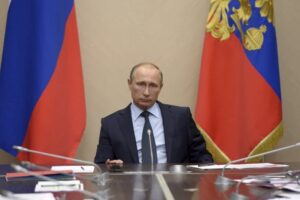Western media likes to portray Putin’s mind as a mysterious and unknowable place.
It’s true that predicting what he’ll do next is a guessing game. It’s also very likely true that emotion, as well as rationality, plays a role in his decision-making. (Isn’t that somewhat true of all national leaders, though?)
But Putin, in a way, is knowable and not all that mysterious; just ask those who study him, and the context in which he operates.
For starters, Putin has never recognized Ukraine’s independence. In 2008, he told George W. Bush, ““You have to understand, George. Ukraine is not even a country,” a view shared by most Russians. At best, Russia’s post-Soviet government has “never accepted anything but conditional independence of the former republics, predicated on an alliance with Moscow and belonging to Russia’s sphere of influence,” according to Prof. Serhii Plokhii (profile here), a Harvard professor specializing in Ukrainian history (story here).
Ronald Suny (profile here, article here), a U.S. scholar specializing in Russian history, looks at the “broader context” of the “current crisis.” He describes Russia as “a weakened but still ambitious regional power in decline” that “feels insecure” and “wants a restoration of its lost influence.” This includes regaining “strategic depth” — i.e., the buffer zone that once existed between Russia and Western Europe, now largely replaced by newly NATO-aligned countries on Moscow’s doorstep.
For Putin, he thinks, “invasion may never have been the point. One interpretation is [he] mobilized his [forces] primarily to force a dialogue with the West over what the spheres of influence and interest in Eastern Europe should be.” This seems credible. Putin certainly has wanted to talk about his demands and grievances. Those talks have dragged on for weeks, and he hasn’t gotten what he wanted at the bargaining table.
Prof. Suny points out that Russia’s GDP is half of California’s, its military budget is 8% of America’s, and NATO’s combined defense spending is 20 times Russia’s.
With that in mind, he sizes up Putin’s thought process this way: “Putin tends to be cautious and realistic in foreign policy. He is not as erratic as sometimes portrayed in the West. He knows that he isn’t playing a strong hand.” That’s all to the good if it’s a restraining influence and limits his ambitions. For example, if he settles for the already-contested part of Ukraine he just grabbed. But will he?
He continues, “Russians also know what it means to bogged down in a ground war as they were in Afghanistan … and as they are currently in … eastern Ukraine. A full invasion would be a catastrophe for Russia.” He also says, “The view of some in the West that Putin wants to rebuild the Soviet Union is, I believe, a fantasy that a realist like Putin has himself rejected,” but notes that “when it comes to Ukraine, the Russian president has in the past made rash moves,” i.e. his seizure of Crimea and incursions into eastern Ukraine.
Prof. Suny argued the never-implemented 2015 Minsk agreement between Ukraine and Russian was a framework, and probably the only one, for a diplomatic resolution of the current crisis. But that was last week; after his moves this week to recognize the “independence” of the contest areas and send in “peacekeepers,” the Minsk document probably is dead.
This brings me to a second article by former U.S. ambassador to Russia Michael McFaul (profile here), in Foreign Affairs magazine (read it here), titled “How to make a deal with Putin.” This is an older article, put in print 11 days ago, almost ancient now, so fast are events moving. It might be obsolete.
In any case, McFaul argued that “only a comprehensive pact can avoid war.” While he avoids the phrase, that seems to be a deal on Putin’s terms, i.e. to roll back NATO to its former Cold War boundaries and promise to never let Ukraine join NATO — demands the U.S. and its allies won’t even discuss.
McFaul, too, thinks Putin is posturing from a disadvantaged position, despite his local military advantage along Ukraine’s borders. “Conquering Ukraine would be no cakewalk,” he says, “and Putin understands that killing thousands of people from a nation he describes as ‘part of Russia’ would be hard to explain to his citizens, especially if the Russian military also suffers major casualties.”
This, he thinks, presents a diplomatic opportunity that Biden and the NATO allies are failing to explore. He contends that “Biden and his team should not just offer defensively minimal concessions to freeze the crisis. Instead, in concert with allies and partners, Biden should seize the diplomatic offensive and counter with a comprehensive, grand bargain for enhancing European security” modeled on the Cold War-era Helsinki Accords (details here), which “stabilized the [European] continent even as U.S.-Soviet competition grew in other parts of the world.” McFaul thinks negotiating “a bigger framework for European security” with Russia could, “in the process, help solve the issues surrounding Ukraine.”
What shape might that take? After spending ink on Cold War history and past agreements, and post-Cold War history, McFaul offers pedestrian suggestions such as “transparency [that] will allow each country to keep tabs on the other’s activities and better predict each other’s actions.” This would include “more frequent monitoring of troop deployments, weapons deployments, and military exercises.” (In fact, Biden has been talking with Putin about that in recent weeks.)
McFaul also suggests “the Biden Administration could … propose some limits on missile defenses in Europe,” and negotiate “to reduce the overall number of missiles—especially nuclear missiles,” and delves into those issues in detail in his article. He says reducing conventional weaponry, too, should be on the table. (But that can’t be unilateral; it requires concessions by both sides.)
“Finally,” he says, “Western diplomats must insist again that Putin obtain permission before placing troops in other countries, which would keep Russia in line with agreements signed by its previous leaders” — which seems unrealistic, and probably also unwise, given Putin’s demonstrated willingness to break promises and violate previous agreements. McFaul acknowledges that “such a deal is unlikely” is unlikely in any case. But, he argues, worth trying for. (But isn’t that at the heart of the current crisis, and the discussions that have taken place?)
On a larger scale, McFaul also acknowledges that, “After decades of division, it will be difficult—and maybe impossible—for Russia and the West to strike any security deals on Europe.” His idea? Instead of fixating on “nonstarters” — Putin’s NATO demands — which “will make reaching a new security agreement impossible,” he thinks “negotiators could make progress by focusing on other issues and then embedding intractable problems into a larger deal.” In other words, “Widening the aperture of the negotiations could create opportunities for deals that are currently not available.”
This is a diplomat thinking within a diplomacy box. But Putin also thinks outside the box, and weighs military options. It’s very hard to view his actions yesterday — effectively annexing eastern Ukraine, and sending in Russian tanks and troops — as just another step in the diplomatic bargaining process. If, as Prof. Suny posited, invasion was “never the point,” well, he just invaded, albeit in a limited and so far bloodless fashion.
But Prof. Suny almost certainly is correct that Putin is looking at a much bigger picture than eastern Ukraine. And with all the demands and grievances he’s laid on the table, and given the size and disposition of the forces he’s arrayed against Ukraine, it’s hard to see him settling for what he just grabbed. Few informed observers in the West believe he’ll stop at this point.
Russia-watchers dating back at least to JFK’s time have long argued that the only thing Russia’s leaders understand is force. Putin is a holdover from the Soviet era, a former KGB man who was stationed in East Germany during the Cold War, and comes from that mold; and he has other Kremlin hardliners pushing him from behind. The form of Russia’s government may have changed, but Russian character has not. Putin’s leadership is characterized by thuggery, violence against opponents and critics, lying, and his agreements are worthless.
But there’s another side to this equation, and that’s Biden’s personality, thought process, and — yes, emotions.
So far, Biden seems intent on displaying resolve. McFaul seems to think he’s too inflexible, and hasn’t explored all the diplomatic options. (Putin says Russia is “always open to diplomacy,” see story here.) Is that really plausible, though? What can he offer, short of caving in to a one-sided outcome?
 But Prof. Suny and Amb. McFaul highlight a general truth about history: The history now being made will be shaped by the personalities, emotions, and limitations of the people making it.
But Prof. Suny and Amb. McFaul highlight a general truth about history: The history now being made will be shaped by the personalities, emotions, and limitations of the people making it.
We know from history that, more often that not, wars are stumbled into through misunderstandings, misreading of intentions, and miscalculations. Are Putin and Biden fatally shouting past each other? Is this another rooster fight? It’s happened before.
Between Putin and Biden, Putin unquestionably is the more stubborn of the two. But even Russian obtuseness must take realities on the ground into consideration. What probably weighs most heavily on him is whether the Ukrainian people now training and arming for guerilla warfare are even more stubborn than he is.
Photo below: More implacable than inscrutable
